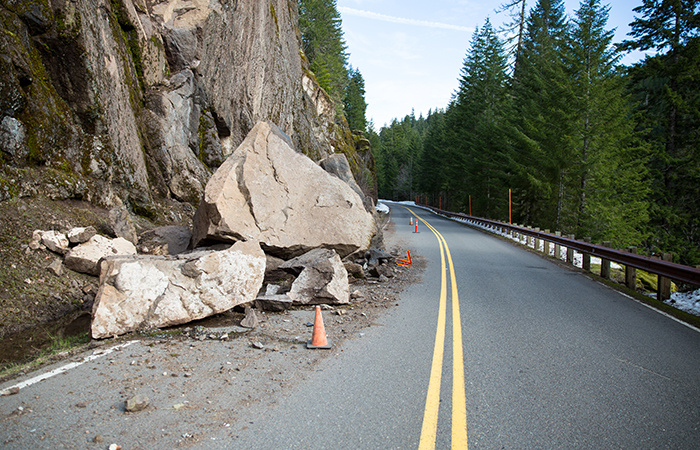The term landslide describes downhill earth movements that can move slowly and cause damage gradually, or move rapidly, destroying property and taking lives suddenly and unexpectedly. Most landslides are caused by natural forces or events, such as heavy rain and snowmelt, shaking due to earthquakes, volcanic eruptions and gravity. Landslides are typically associated with periods of heavy rainfall or rapid snowmelt and tend to worsen the effects of flooding. Areas burned by forest and brush fires are also particularly susceptible to landslides.
Landslides generally happen in areas where they have occurred in the past. Learn about your area’s landslide risk. Landslides can also be referred to as mudslides, debris flows, mudflows or debris avalanches.
Debris flows and other landslides onto roadways are common during rainstorms.
Heavily saturated ground is very susceptible to mudflows and debris flows.
Be aware that, generally, landslide insurance is not available, but that debris flow damage may be covered by flood insurance policies from the National Flood Insurance Program (NFIP) at www.FloodSmart.gov.
Show me Emergency Preparedness tips
About the American Red Cross of Alaska: In Fiscal Year 2019, the American Red Cross of Alaska responded to 435 disasters by offering food, shelter, relief supplies, comfort, hope and recovery services to 1,096 Alaskans in 50 communities statewide. Our preparedness teams installed 2,171 free smoke alarms and educated 1,409 youth through The Pillowcase Project. Our Training Services department enrolled 19,665 students in first aid/CPR/AED, aquatics and caregiving classes. Our Service to the Armed Forces staff exchanged 1,299 emergency messages for U.S. military service personnel and their families. The Red Cross is a nonprofit organization that depends on volunteers and the generosity of the American public to perform its mission. In Fiscal Year 2019, our statewide workforce of 729 volunteers logged 40,735 hours in service to our mission and their fellow Alaskans. For more information, please visit redcross.org/Alaska or visit us on Twitter at @redcrossak.

